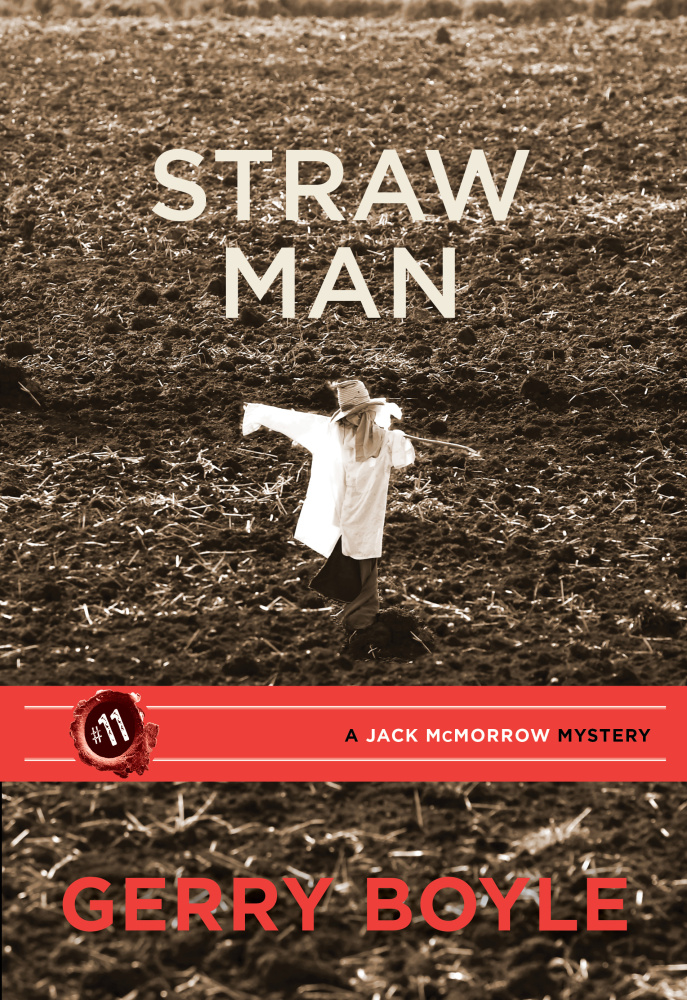An elderly woman needs trees cut to quickly raise cash in an emergency. Jack McMorrow, a freelance writer for The New York Times, and his two buddies, Clair Varney and Louis Longfellow, former combat Marines, drop everything to head off into the woods to aid her.
In such circumstances, the people of Prosperity, Maine, are fortunate to have such good neighbors. The same is true should everything go terribly south in those woods. The trio is quite capable of dispensing rough justice as their moral bearings deem necessary, often working at the far fringe of the law – and then some.
This makes for a volatile mix in Maine writer Gerry Boyle’s new novel, “Straw Man,” the 11th installment in his Jack McMorrow mystery series.
Boyle gets right to it in the first chapter, when the good Samaritans encounter an “outlaw” crew taking trees that don’t belong to them. The friends try to be civil but direct in correcting any misunderstanding the intruders might have about whose land they’re on.
Doesn’t matter to the lowlifes. Civility goes only so far when a knife is pulled and a gun brandished.
McMorrow and his buddies bare-handedly dispatch the four tree bandits with a beating they never saw coming and won’t soon forget, sending one to the hospital with a horribly broken arm.
Humiliated, the bad boys, a mélange of girlfriend-beating, sex-offending, gun-running troublemakers, are fueled for payback. The dispute spills out of the woods and into the community, threatening McMorrow’s wife, Roxanne, and their 8-year-old daughter, Sophie.
To complicate things, Roxanne McMorrow is involved in promoting an educational program promoting peace and nonviolence in the local school. Her teaching partner is a well-to-do neighbor who is the single father of Sophie’s best friend. This sets up a tortured conflict over pacifism versus violence between McMorrow and his wife, with jealousy thrown in, McMorrow growing suspicious about the true intentions of his wife’s colleague, a man with more money than sense and a yearning for lovely Roxanne.
Meanwhile, an isolationist settlement of strict Old Order Mennonites seeks to live simply in the area, wanting to preserve their 500-year traditions and protect their children from the seductions of the world. The bishop tells McMorrow when they first meet, “Wide is the gate and broad is the way to destruction.” Keeping the gate closed by edict, however, is insufficient, and the bishop’s family gets disastrously drawn into the conflict.
Boyle handles all this masterfully. His plotting is tight and his characterizations, for the most part, are compelling. Varney and Longfellow are richly developed, fearless yet sympathetic. The bad guys are merely stock characters, vile and evil, but they get what they deserve.
The subplot around the Mennonites is fascinating and a perfect foil for the madness that swirls through the wider community and the world.
“Straw Man” is a great book to take on a plane, to the beach or to bed if you don’t really want to sleep. Boyle is a deft craftsman and a wonderful storyteller. With “Straw Man,” he sets high expectations from the start, and he doesn’t disappoint.
Frank O Smith is a Maine writer and ghostwriter whose novel, “Dream Singer,” was named as a finalist for the Bellwether Prize, created by best-selling novelist Barbara Kingsolver. Smith can be reached via his website:
frankosmithstories.com
Send questions/comments to the editors.




Comments are no longer available on this story